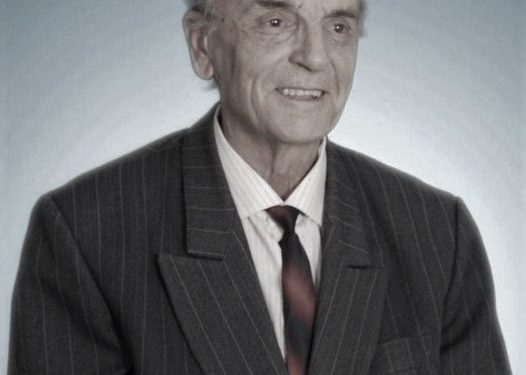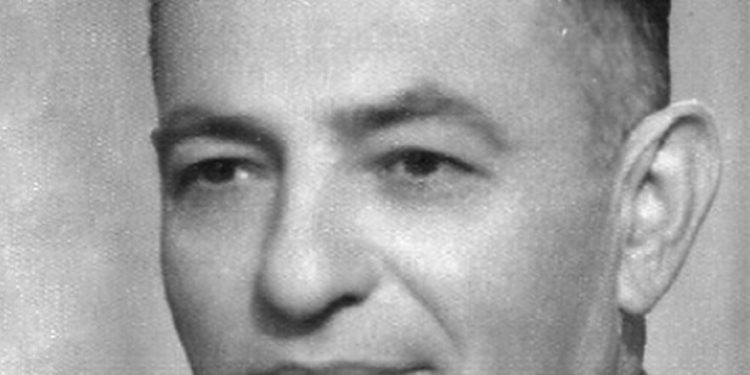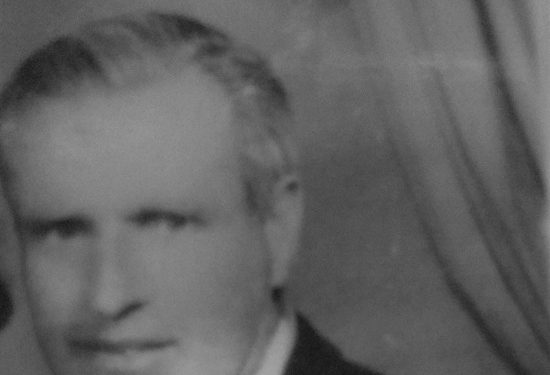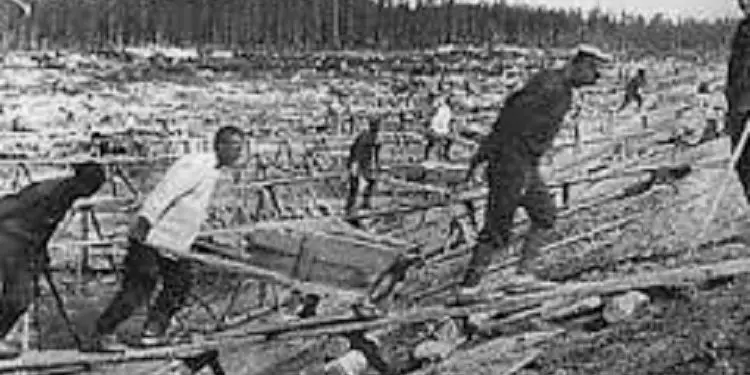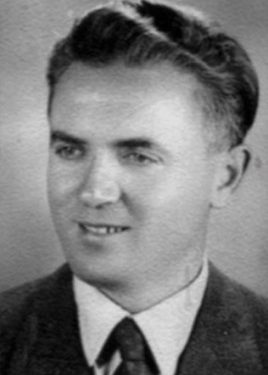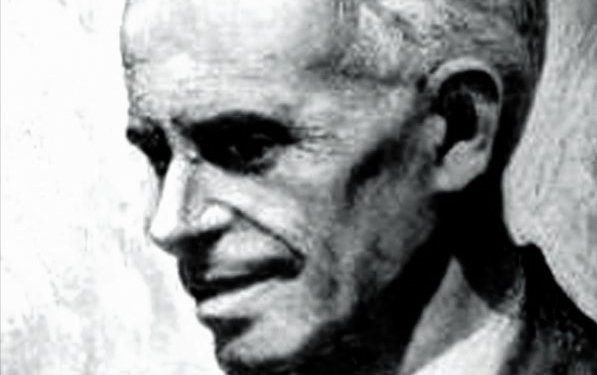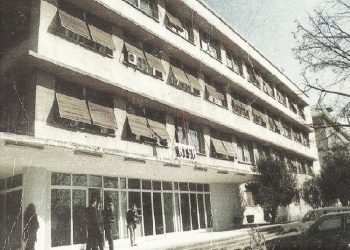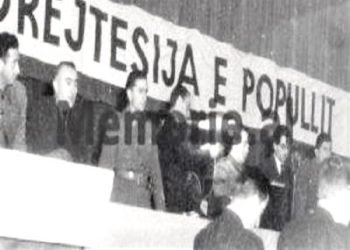By Reshat Kripa
Part eight
Memorie.al / “Sometimes, when difficult trials fall on a child’s head from the earliest age in the secret recesses of his soul, a kind of scale is born, a beautiful scale, with which he weighs the affairs of this world . Feeling himself innocent, he submitted to his fate without making a sound. I didn’t cry at all. He, who has no reason to be scolded, does not scold others”!
(Viktor Hugo, “The Man Who Laughs”)
– SHORTED YOUTH –
Dedicated to family and society,
Author
Continues from last issue
Memoir
VLORA PRISON
In the camps, I met many famous men. They were the brightest minds of Albanian nationalism. The dictatorship had imprisoned him to eradicate any sign of him. They had finished their studies in the most prestigious universities in Europe, from Rome to Paris, from London to Vienna. Their influence on my formation was very great. They completed the civic education that I had received in the family. If I passed through that hell without being defiled, it was thanks to these men. They protected me and taught me. From them I learned the true history of this country, scandalously transformed by the charlatan and servile pseudo-historians of the totalitarian system.
From them I learned the true story of the nationalist forces fighting the invaders. He had told me about them, Halo Çanua, in cell number seven. But that was the story of a simple soldier. While now I heard it with full arguments, from the mouth of its exponents. I felt pleasure when the prominent jurist Xhevdet Kapshtica, from Korça, spoke to me about the famous Decalogue. The ten points of that decalogue, expressed so passionately by him, still ring in my ears. So, this decalogue was compiled by Mit’hat Bey Frashëri, son of Abdyl and grandson of Naim and Sami the great, and his other companions. All this led me to learn that there was another story, which the government authorities had tried to hide from us.
I remember the meeting with Mit’hat Frashëri, which happened to Meçan Hoxha:
– “It had been over two years since I had finished my studies in agronomy,” he said. – I was located in Tirana. I was wearing a new, white suit that showed me a handsome guy who liked himself. I wanted to buy a philosophical book that had been published in Italian in those days. Nearby was the “Lumo Skëndo” bookstore. I went inside. A man dressed in a blue suit stood at the counter. I told him the title of the book. He looked at me attentively and asked me:
– “Where are you from, boy?”
– “From Vlora” – I answered.
– “What kind of work do you do?”
– “I am an agronomist”.
He pursed his lips and spoke to me in an almost fatherly voice:
– “Listen, boy. Take off those clothes, put on the overalls and go to work in the fields of Albania. There are two branches where our country should develop, agriculture and tourism. You are the new generation that will contribute in this direction”.
“Those words made me feel tight. I was ashamed to have dressed like that. In front of me was the ‘Apostle of Albanianism’, Mit-hat Bej Frashërin. I greeted him with respect and left, remembering the words he had told me”.
This is what Meçan Hoxha told me.
The list of such men I met during my time in prison is very long. But, among them I want to mention the unforgettable names of doctor Isuf Hysenbegas from Pogradec and the engineers; Sami Bitincka and Andrea Xega, from Korça, lawyer Haki Karapici from Tirana, Klerikkeve; Patër Mëshkalla and Gjon Shllaku, as well as pharmacist Kol Kurti from Shkodra, lawyers Fatosh Kokoshi, Jani Ikonomi from Vlora, or Lefter Kriston, with whom we had come together from Vlora prison, Myfit Shehu from Borshi, and many others.
I also respectfully remember the names of; Avdurahman Kreshpës, Engjëll Kokoshit, Tahir Hoxha, Dushan Koçiut, Ilmi Xhaferit, Selim Rapo, Muhamet Muratit, Serri Jazos, Abdyl Haskos from Vlora, Xhafer Butkës and Emror Kolecit from Cologne, Sami Repishti from Shkodra, Bajazit Kaloshit from Dibra, Allaman Hysës and Asllan Allamanit from Mati, brothers Refik and Tefik Çepelja from Fieri, Besim Greshica from Mallakastra, Abdulla Berberi from Kruja, Njazi Gorica and Qemal Shehu from Gjirokastra, Hasan Zamës and Leonidha Tarusha from Korça, Sorkadh Çikas from Borshi and many other men.
Njazi Gorica, former owner of a bookstore in Gjirokastër, constantly wore a republic hat on his head, a special thing for that place. When his friends asked him why he wore it, he answered:
-“I’m a fanatical republican, so I keep it”!
But his hat often got in the way. When he sat down to have a little fun, the guards immediately recognized him by his hat and called him: “Hey, republican, get up”!
During the war, he was positioned in the ranks of the “National Front”. At the time when Italy had capitulated and the Germans had not yet arrived, rallies were held in Gjirokastra in “Cerçizit Square”. Both partisans and ballisticians participated in these rallies. In one of them, Bedri Spahiu from the partisans and Ali Bey Këlcyra, from the ballisticians, took part. Behind him stood Njaziu. Bedriu spoke first. He left nothing unpromised, even the gold spoon, with which the Albanians would eat after liberation. Then Ali spoke:
-“These,” he said addressing Bedri, “not only will they not give you the golden ones to eat with a spoon, but they will also take away the wooden ones, so that you will be left without anything to eat”.
A great laugh was heard from the crowd. Enraged, a handful of provocateurs began to whistle.
– “Whistle, whistle – Ali told them – I don’t fall into your hands, but woe to you who will carry the horrors of that system on your back.”
Njaziu kept telling this story
A special place in my life of those years was occupied by the figure of Hysni Shabani, the brave machine gunner of the “National Front” from Ngraçani in Mallakastra. He became like a second brother to me. He loved me so much that he was ready to sacrifice anything to help me. He had no school, but he had a great spirit and heart. It was said that in the battle that the “Balli” detachment had with the fascists, he shot the Italian flag, which was flying in front of him. When his friends asked him why he did not shoot at the soldiers, but at the flag, he answered them
– “I want to break their pride”.
It continued to shoot, until the flag fell and the Italians were also broken with it. After the war, he did not surrender, but stayed for more than a year in the mountains, fighting for the violated freedom. He was betrayed by a man of his tribe, where he had gone for a morsel of bread. At the time he was washing his head and had it covered with foam, the Defense Forces arrested him. He spent a year in the Security cells in Fier. But he did not lower his head.
– “Keep your heads up”! – He called to his friends from the cell.
The court sentenced him to death, which was later commuted to life imprisonment.
In the camp there was also a group of lively and broad-minded young people. I want to single out here the names of Burim Kokoshi, Klito Lamajt, Filip Daulles, Agim Bimos and Pirro Djindi from Vlora, Tanush Frashëri from Korça, Viliam Hysenbegasi and Ylber Starova from Pogradeci, Ilia Tereskė from Berat, Gjon Dedas from Mirdita, Matish Çefes, To Tonin Prosi, Ahmet Bushati, Thabit Rusi, Et’hem Bakalli, Ndoc Ljarja, Bernard Dabërdak, Ferit Muftija, Tom Sheldija, from Shkodra, as well as many others, whom I ask you to forgive me for not mentioning their names, but long time and age have darkened the mind, and the mist before my eyes has covered their names.
I was impressed by the story of Gjon Deda, from Mirdita. He was young. He was engaged to a girl, who loved him like crazy. He had also set the wedding day. But they didn’t let him enjoy it. He was arrested a few days before her. This event reminded me of Edmond Dantes, who was separated from Mercedes, a few days before the wedding, in the novel “The Count of Montecristo” by Aleksandër Dymas.
* * *
We usually came back from work very tired. However, we also found moments of fun. This is for the sake of the beautiful songs and the wonderful voice of Myrtezai and Koço Plasoti, from Korça. The songs were accompanied by a guitar played by Koçua. Myrtezai’s favorite song was “oh my mountain spice”. That song reminded him of Alketa, so he sang it passionately:
“Oh my mountain spice
That is blowing fast,
When you arrive in the plain lands
Don’t forget an order.
Far away even in Vlora,
Beat a heart that waits for me,
So please at any hour
To forgive me with health”!
He had changed the second stanza. Actually she was:
Far away and in Tirana,
Beat a heart that waits for me,
So please go to him,
And forgive him with good health.”
– “Why do you change the lyrics of the song”?! – I said with a smile.
He also started laughing out loud. He did such a thing, as it seemed to him to bring out Alketa’s longing.
Koçua had been a tenor in the Albanian Philharmonic. He was passionate about classical music. You could hear him speak passionately about the world’s great composers. They had placed a loudspeaker in the courtyard, which was connected to Radio Tirana. Every Sunday at 19.30 – 20.00, it broadcasts classical music. Koço was there listening.
It was a winter Sunday. An icy rain was falling. A cold roar had covered the whole place. It was getting close to 8:00 p.m., traffic stop time. I went to his bed, to ask him about something. It wasn’t there.
– “You have it at the place”, – said the friend sleeping next to him.
I understood. Koçua was listening to music. I went outside and saw him lost in the music. The cold rain continued to fall, but he didn’t want to know. A little more and the circulation period expired. I approached and spoke to him:
– “Mr. Koço, we have to go.” After a while, the time of staying outside ends.”
– “Relax, it’s Beethoven”! – He said in a light voice, deep in his fantasy.
It was the Egmont overture. I saw that I could not move it, before the music ended. But at that time, it was interrupted.
– “Ignorant closed it”! – He spoke with a big grunt. We left and entered the shed.
We felt pleasure when he sang. In particular, we used to listen to the beautiful Neapolitan song; “Back to Sorriente”:
“You said gone, goodbye,
Ike, leave me my heart,
This place with such desire,
How can you run away and leave!
Don’t forget to wait for me
Don’t leave me alone!
Back in Sorriente,
Don’t let me die”!
We often asked him that; why did he sings this song in Albanian and he answered:
– “Doesn’t it sound more beautiful like this”?!
In addition to light and classical music, popular songs were also sung in the camp. Two boys from Malsia e Madhe sang patriotic and love songs from the Northern provinces, accompanied by couplets. Their voices sounded to me like a chorus of whistles. While the band Lab, stood out among the singers of southern music. Their song seemed to me like symphonic music. In this group, the voice of Jorgo Besho stood out, which sounded like a dedication bell:
“Go to America, go to Albania,
Pope Anastasi, priest in Mellani.
Go down to Saranda and find Greece,
You went to Gjirokastra, to Mitropoli
The people you gathered, what you spoke to them,
Who is turkoshak, to go to Turkey?
Who is a Greek speaker, go to Greece?
Who is Albanian, die for freedom”!
This is how Jorgo Beshua, the minority from Çatistra, near the border, sang.
At the end of the year, we moved from Ura-Vajgurore to Vlashuk. I felt a great void, that I would be separated from Besnik.
Before departure, he ordered me:
– “For everything you need, turn to the Source and Klitos. They would come with me. Along with them, Jorgua with Myrtezana, Dino, Matish and Hysniu”.
Memories from the Vlashukut camp
That day the weather was very bad. A torrential rain started in the morning. It roared and flashed, as if everything was about to be turned upside down. As it calmed down a bit, we got into the cars and we left. Our dens were loaded into another car. The cars took the direction of Kuçova. We passed the town and a bridge over the river Devoll and stopped. They brought us down and ordered us to; each to take his dengue on his arm. There were no motorways further, so we had to do it on foot. .
Vlashuk, towards which we were going, was located on top of a high hill. The rain continued to fall, although not with the previous intensity. The policemen accompanying us were wearing big capes and boots, so they didn’t get wet. We had become water. However, we were forced to walk through a muddy road, with dengue on our side, where we often slipped and had to get up immediately, because otherwise, the guard would come with a whip in his hand and shoot where he could, saying:
– “Get up because you got in the way of your friends”!
The convoy of slaves continued on its way.
After almost two hours, we arrived at the camp. We got into the silos as best we could. I opened the den of spoils. They had escaped without getting wet, a pair of changes, which were between him, as well as a blanket. I was overjoyed. I quickly changed and wrapped myself in the blanket. We spent that night curled up on the bunks of the barn, shivering from the cold.
The next day, the weather dawned and the sun came out. It was our fate, to dry the troubles. That day, our organization was also done, in brigades and silos. I fell into a brigade with Myrtezana and Jorgo.
In Vlashuk, work was carried out to drain the Thana Swamp. For this, a long canal had to be opened, about six kilometers. Its first kilometer, due to the mountainous relief, had to be excavated up to thirty meters deep, where large concrete pipes were placed for the water to pass. Up to the first ten meters of depth, digging was done by hand and soil was transported by handcart, along a zigzag road. Then its extraction was done by crane and transported by handcart.
In the camp, we had no drinking water. Even the village, which was a few kilometers away, filled a single well, located at its outlet. We used as drinking water, what was collected in a pit dug by the excavator. In the spring months, there was the croaking of frogs, which reminded me of the song that Tish Daija had taught us in school:
“Spring came and the cold went away, everything bloomed,
Even the frogs in their own marshes sing everywhere”.
When we sang this song at school, I could not imagine that one day I would drink frog water. The former joy of that song had turned into sadness. The romance of her verses was extinguished. Memorie.al
The next issue follows




